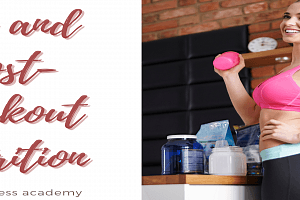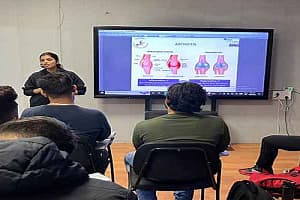Pre and Post-workout Nutrition
Created On: Mar 9, 2021

Dr. Chirag Sethi* and Dr. Swarna Anchal**
*Director, Classic Fitness Academy, New Delhi
**Technical Writer, Classic Fitness Academy, New Delhi
Introduction
The most common question for dietitians and nutritionists is about pre and post-workout meals. Sometimes the answer can be different from the perspective of athletes, their specific activity, and personal choices. However, there are some common points for pre and post-workout nutrition. What to eat before and after a workout initially seems to be a struggle but it's worth it.
Choosing a pre-workout snack, it is important to include such food articles that not only you enjoy but also give you maximum benefits. Likewise what you eat after a workout is really important too that indeed helps in refueling and recovery after exercise and helps you build bigger, stronger muscles. So what should include in the pre and post-workout snacks and points should be taken into consideration while taking meals is discussed here in this article.
Time for a pre-workout meal
It is recommended that not to eat immediately before a workout because at the same time your muscles are busy in training and your stomach is trying to digest the food. This not only disturbs the performance but also may cause some gastrointestinal (GI) discomfort during training. It is best to take a meal about 1 to 4 hours before the workout, depending on how your body tolerates food.
Don't Skip the Carbohydrates
Carbohydrates work as fuel for the body. Harder you workout, the more carbohydrates you needed. When we eat carbohydrates in a meal, they break down into glucose which is taken up by muscle cells and provide energy for exercise. During workouts, our stored glycogen is used up from muscles and the liver.
One should always have extra glucose with them if needed it will replenish the glycogen stores and also prevent the reduction in blood glucose level.
Make sure your pre-workout snack has protein
The pre-workout snack should include a little bit of protein because when we do strength-training, small tears in our muscle fibers are created. During rest, our body repairs those micro-tears; building up muscles with the help of protein taken in a meal. The most important point to remember is to choose the sources of protein that are easy to digest and eat small portion so that it does not upset the stomach during a workout.
Drink plenty of water
Your body must be hydrated before you going to the gym to avoid dehydration. One can determine the overall hydration status by checking the color of urine in the morning, lemonade-colored urine is a sign of appropriate hydration, while dark-colored urine indicates a deficiency of water. Pre-workout, water intake is 250-350mL is recommended. During a workout, one takes water 20-30mL in small sips.
Here are some suggestions for pre-workout fuel:
Each of these suggestions includes some protein to rebuild and repair as well as carbohydrates to refuel.
Post-workout Nutrition
Refueling your body is most important for recovery particularly if the workout lasts longer than 60 minutes and is strength-based. The food should be rich in protein that helps in rebuilding and repairing.
Time for a post-workout meal
If the workout is short and of moderate-intensity then a person can wait until the next meal. If the workout was longer than 2 hours and the person is doing a workout every day then it is best to have a carbohydrate snack within 2 hours post-workout to replenish glycogen and then protein after 25-30 minutes.
Rehydrate yourself post-workout
Drink water to replenishing the fluids you have lost while sweating. Water intake after exercise depends on many factors, like the length and intensity of the exercise, the environmental conditions, and your physiology. Post-workout water intake can be 450-675mL depending on sweating, and environmental conditions. Post-workout drinks can include smoothies made up of low-fat milk and fruit, Low-fat chocolate milk, low-fat yogurt with berries, etc. These not only offer carbohydrates but also help to rehydrate the body.
Some suggestions for Post-workout Meals:


*Director, Classic Fitness Academy, New Delhi
**Technical Writer, Classic Fitness Academy, New Delhi
Introduction
The most common question for dietitians and nutritionists is about pre and post-workout meals. Sometimes the answer can be different from the perspective of athletes, their specific activity, and personal choices. However, there are some common points for pre and post-workout nutrition. What to eat before and after a workout initially seems to be a struggle but it's worth it.
Choosing a pre-workout snack, it is important to include such food articles that not only you enjoy but also give you maximum benefits. Likewise what you eat after a workout is really important too that indeed helps in refueling and recovery after exercise and helps you build bigger, stronger muscles. So what should include in the pre and post-workout snacks and points should be taken into consideration while taking meals is discussed here in this article.
Time for a pre-workout meal
It is recommended that not to eat immediately before a workout because at the same time your muscles are busy in training and your stomach is trying to digest the food. This not only disturbs the performance but also may cause some gastrointestinal (GI) discomfort during training. It is best to take a meal about 1 to 4 hours before the workout, depending on how your body tolerates food.
Don't Skip the Carbohydrates
Carbohydrates work as fuel for the body. Harder you workout, the more carbohydrates you needed. When we eat carbohydrates in a meal, they break down into glucose which is taken up by muscle cells and provide energy for exercise. During workouts, our stored glycogen is used up from muscles and the liver.
One should always have extra glucose with them if needed it will replenish the glycogen stores and also prevent the reduction in blood glucose level.
Make sure your pre-workout snack has protein
The pre-workout snack should include a little bit of protein because when we do strength-training, small tears in our muscle fibers are created. During rest, our body repairs those micro-tears; building up muscles with the help of protein taken in a meal. The most important point to remember is to choose the sources of protein that are easy to digest and eat small portion so that it does not upset the stomach during a workout.
Drink plenty of water
Your body must be hydrated before you going to the gym to avoid dehydration. One can determine the overall hydration status by checking the color of urine in the morning, lemonade-colored urine is a sign of appropriate hydration, while dark-colored urine indicates a deficiency of water. Pre-workout, water intake is 250-350mL is recommended. During a workout, one takes water 20-30mL in small sips.
Here are some suggestions for pre-workout fuel:
Each of these suggestions includes some protein to rebuild and repair as well as carbohydrates to refuel.

Post-workout Nutrition
Refueling your body is most important for recovery particularly if the workout lasts longer than 60 minutes and is strength-based. The food should be rich in protein that helps in rebuilding and repairing.
Time for a post-workout meal
If the workout is short and of moderate-intensity then a person can wait until the next meal. If the workout was longer than 2 hours and the person is doing a workout every day then it is best to have a carbohydrate snack within 2 hours post-workout to replenish glycogen and then protein after 25-30 minutes.
Rehydrate yourself post-workout
Drink water to replenishing the fluids you have lost while sweating. Water intake after exercise depends on many factors, like the length and intensity of the exercise, the environmental conditions, and your physiology. Post-workout water intake can be 450-675mL depending on sweating, and environmental conditions. Post-workout drinks can include smoothies made up of low-fat milk and fruit, Low-fat chocolate milk, low-fat yogurt with berries, etc. These not only offer carbohydrates but also help to rehydrate the body.
Some suggestions for Post-workout Meals:


Take-Home Points
- Your body needs carbohydrates to fuel your working muscles.
- Protein helps in building and repairing.
- Get a combination of the protein and carbohydrates in your body 1 to 4 hours pre-workout and within approximately 60 minutes post-workout.
- Drink enough water to avoid dehydration.
References:
- Aragon AA, Schoenfeld BJ (2013) Nutrient timing revisited: is there a post-exercise anabolic window? Journal of the International Society of Sports Nutrition 10(1):5.
- Bussau VA, Fairchild TJ, Rao A, Steele P, Fournier PA (2002) Carbohydrate loading in human muscle: an improved 1-day protocol. European Journal of Applied Physiology 87(3):290-5.
- Gollnick PD, Matoba H (1984) Role of carbohydrate in exercise. Clinics in Sports Medicine 3(3):583-93.
- Hawley JA, Burke LM (1997) Effect of meal frequency and timing on physical performance. British Journal of Nutrition 77(1):91-103.
- MaughanRJ (2012) Investigating the associations between hydration and exercise performance: methodology and limitations. Nutrition Review 70(2):128-31.
- Tipton KD, Elliott TA, Cree MG, Aarsland AA, Sanford AP, Wolfe RR (2007) Stimulation of net muscle protein synthesis by whey protein ingestion before and after exercise. American Journal of Physiology-Endocrinology and Metabolism 292(1):71-6.
- Tipton KD, Ferrando AA, Phillips SM, Doyler D, Wolfe RR (1999) Postexercise net protein synthesis in human muscle from orally administered amino acids. American Journal of Physiology 276(4):628-34.
- Venkatraman JT, Feng X, Pendergast D (2001) Effects of dietary fat and endurance exercise on plasma cortisol, prostaglandin E2, interferon-gamma and lipid peroxides in runners. Journal of American Collection of Nutrition 20(5):529-36.






